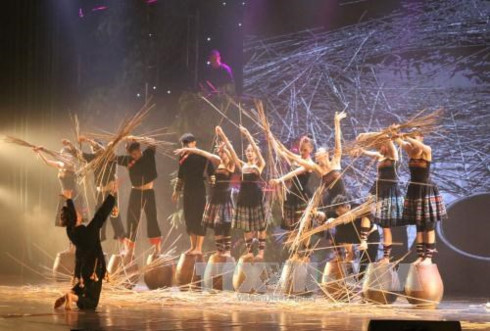
The International Dance Festival 2017 kicked off in the northern province of Ninh Binh on September 16, drawing the participation of about 300 domestic and foreign artists.

The festival gathered
about 15 dance troupes from 14 countries, including Laos, Cambodia, Myanmar,
the Philippines, the Republic of Korea, Colombia, Singapore, Egypt, Japan,
Indonesia, China, Bangladesh, Russia, Malaysia and host Vietnam.
The artists will stage dances lasting from 20 to 40 minutes that
will be judged on artistic merit.
As many as 200 artists from nine Vietnamese troupes participated
in the event. They were from the Vietnam Dance College, Vietnam National Ballet
and Opera, Military Culture and Arts College, southern-based Sao Bien Folk
Dance and Sing Theatre and provincial troupes from Cao Bang, Ha Giang, Hoa
Binh, Son La and Tuyen Quang.
The festival was designed to bolster Vietnam’s culture and art
cooperation with other countries, offering a chance to promote the country’s
images, people and culture to international friends.
It was also viewed as an opportunity for Vietnamese dancers to meet
and learn from experiences of other artists. The festival will run until
September 22.
Source: VOV
With an increasingly vibrant and widespread emulation movement aimed at building cultured residential areas and cultured families, Yen Thuy District has been making steady progress toward improving both the material and spiritual well-being of its people, while fostering a civilized, prosperous, beautiful, and progressive community.
Once lacking recreational spaces and community facilities, Residential Group 2 in Quynh Lam Ward (Hoa Binh City) has recently received attention for the construction of a new, spacious, and fully equipped cultural house. The project followed the model of state support combined with public contributions in both labor and funding.
The "All people unite to build cultural life" movement, which has been effectively integrated with Kim Boi district’s socio-economic development goals, is fostering a lively spirit of emulation across local residential areas, hamlets, villages, public agencies, and enterprises. In addition, through the initiative, traditional cultural values are being preserved and promoted, while community solidarity and mutual support in poverty reduction and economic development are being strengthened.
A working delegation of the Hoa Binh provincial People’s Committee led by its Permanent Vice Chairman Nguyen Van Toan on June 11 inspected the progress of a project to build the Mo Muong Cultural Heritage Conservation Space linked to tourism services in Hop Phong commune, Cao Phong district.
Born and growing in the heroic land of Muong Dong, Dinh Thi Kieu Dung, a resident in Bo town of Kim Boi district, in her childhood was nurtured by the sweet lullabies of her grandmother and mother. These melodies deeply imprinted on her soul, becoming an inseparable part of her love for her ethnic group's culture. For over 20 years, this love for her hometown has driven Dung to research, collect, and pass down the cultural values of the Muong people to future generations.
In the final days of May, the Ethnic Art Troupe of Hoa Binh Province organized performances to serve the people in remote, mountainous, and particularly disadvantaged areas within the province. These were not just ordinary artistic shows, but they were the meaningful journeys aimed at spreading cultural values, enhancing the spiritual life of the people and contributing to the preservation of ethnic minority cultural identities.



